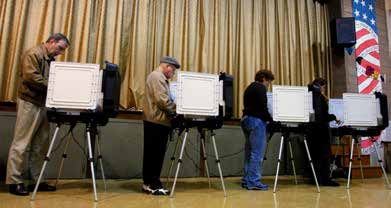The following is reprinted from the Sept. 25, 2022, edition of the Florida Catholic with edits.
ORLANDO | As the Nov. 5 general election fast approaches, Deacon Dave Camous, director of the permanent diaconate, considered the best way to form diaconal candidates and prepare them to respond to parishioners, friends, and family “in this highly charged political year.” In his invitation, he said, “It is even more important that parish leaders responsibly and accurately teach the Church’s position regarding proper formation of conscience.”
Although the 90-minute workshop, rooted in the teachings related to discernment and faithful citizenship from the U.S. Conference of Catholic Bishops (USCCB), taught deacons, the lessons are for every Catholic seeking to navigate current times. “Forming Consciences for Faithful Citizenship: The Role of the Deacon in Pastoral Leadership During an Election Year” covered how the faithful are to “exercise their obligation as citizens grounded in the truth of the Gospel message,” noted Deacon Camous. It also focused on understanding the best way to decide “based on faith and reason.” He emphasized the objective was not to tell people which candidate to choose or to condemn those with different opinions.
Deacon Richard Ferris, Class of 2022 from Blessed Sacrament Parish, Clermont was among the 30 candidates, deacons, and wives attending. Deacon Ferris does not consider himself overly political, but notes this election is “hyperpoliticized.” Witnessing the polarization in his own parish, he said his main concern was how to reach people in both parties. “I went into this looking to learn how to communicate the truth of the Gospel and our Catholic teaching, without isolating people in either party.”
Deacon Camous encouraged attendees to remember “each person is a child of God; assume the best possible intentions of others”—an idea based on Ignatian theology. And above all, listen patiently seeking understanding.
Deacon Elbert Pagan (St. Rose of Lima Parish, Kissimmee) noted the “noise” that surrounds us has made many Christians forget the call to base our decisions on Gospel teaching. Feeling somewhat lost himself, he asked, “How can I bring myself back into focus and offer advice to others?”
Clarifying the workshop was not meant to affirm or validate positions, but to urge participants to reflect on their decision considering Gospel truth and teaching, Deacon Camous noted many would leave feeling uncomfortable. For Deacon Pagan, the workshop affirmed and challenged his beliefs. “I didn’t walk out of this workshop saying ‘Eureka!’ I did come out of it with a blueprint,” he said. “Conflict is good if you can discern it, work through it and grow from it.” He noted conflict is often God prompting you to go deeper.
Many found particularly challenging the teaching that Catholics are not called to vote based on one single topic, but to look at the broader implications. Feeling strongly about dignity and sacredness of life, the abortion debate was key for him and others. The workshop helped Deacon Pagan look beyond the single issue and consider all dignity of life issues (death penalty, immigration, poverty, end of life care).
He then pondered solutions, policies and social programs that can be incorporated to further Catholic values. “We can start there (with the topic), but we can’t end there,” Deacon Pagan discovered.
Quoting the Catechism of the Catholic Church, Deacon Camous explained, “Conscience is a judgement of reason that engages the head and the heart. In all he says and does, man is obliged to follow faithfully what is just and right” (CCC 1778). We are called to make decisions, not on a feeling. It’s the voice of God resounding in the human heart that reveals truth to us,” he said. “There must be solidarity and an understanding that every life in every country has value.”
Deacon Camous reminded those present, “None of the candidates are your savior. There is no party of Jesus Christ.” Thus, the bishops teach to faithfully form one’s conscience, there must be a desire to embrace goodness and truth; study Scripture and Church teaching; examine facts and background information; focus on moral principles and the needs of the weak, the common good and especially to prayerfully reflect.
“As Catholics, we have a long tradition of engagement in the political process as a means of putting our faith into action,” the USCCB teaches. “We are called to bring the best of ourselves and our faith to the public square—and yet today, many shy away from such involvement because our national and local conversations are filled with vitriol and harsh language, often directed at people themselves. When personal attacks replace honest debate, no one wins. This kind of attack, no matter the reason, only serves to further divide our communities. As Catholics, we must model a better way.”
Deacon Pagan agreed noting, “We as Christians need healing. If we heal, there’s a chance to go forth and heal this country. It needs water to quench this fire. I hoped this class would help me be a firefighter.”
“I think this is going to impact me in my call to the diaconate,” Deacon Ferris noted. Now he is “more mindful” that his words “can affirm or isolate somebody.” He plans to bring “more intentionality to the teaching of the Church to inform conscience.”
Resources for voter discernment: U.S. Conference of Catholic Bishops Faithful Citizenship, Florida Conference of Catholic Bishops, Florida Catholic Advocacy Network
By Glenda Meekins of the Florida Catholic staff, October 24, 2024

